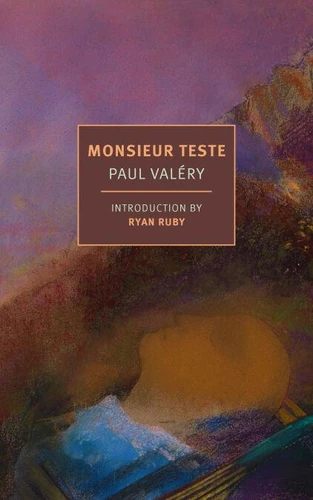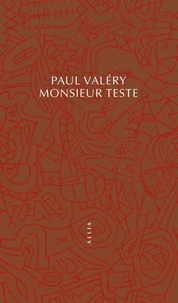Né à Sète le 30 octobre 1871, Paul Valéry fait la connaissance de Pierre Louÿs et de Gide avec qui il fréquente le salon de Mallarmé. Rédacteur au ministère de la Guerre, puis secrétaire particulier d'un administrateur de l'agence Havas, il accède aux cercles fermés de l'information et de la finance. Elu à l'Académie française en 1925, il est nommé professeur de poétique au Collège de France en 1937. Il meurt le 20 juillet 1945 à Paris où on lui fait des funérailles nationales.
Formats :
Disponible dans votre compte client Decitre ou Furet du Nord dès validation de votre commande. Le format ePub protégé est :
- Compatible avec une lecture sur My Vivlio (smartphone, tablette, ordinateur)
- Compatible avec une lecture sur liseuses Vivlio
- Pour les liseuses autres que Vivlio, vous devez utiliser le logiciel Adobe Digital Edition. Non compatible avec la lecture sur les liseuses Kindle, Remarkable et Sony
- Non compatible avec un achat hors France métropolitaine
 , qui est-ce ?
, qui est-ce ?Notre partenaire de plateforme de lecture numérique où vous retrouverez l'ensemble de vos ebooks gratuitement
Pour en savoir plus sur nos ebooks, consultez notre aide en ligne ici
- Nombre de pages104
- FormatePub
- ISBN978-1-68137-893-0
- EAN9781681378930
- Date de parution03/12/2024
- Protection num.Adobe DRM
- Taille885 Ko
- Infos supplémentairesepub
- ÉditeurNYRB Classics
Résumé
A defining work of twentieth-century modernism, now newly translated-a philosophical novel about the nature of consciousness, all centered around a character who is composed of absolute brain and intellect, a character of pure mind. In 1892, during an intense thunderstorm, the great Symbolist poet Paul Valéry underwent an existential crisis. For the next twenty years, he wrote no poetry, devoting himself instead to the study of philosophy, mathematics, and language-and to the creation of his literary alter ego, Monsieur Teste, who first appeared in the 1896 novella The Evening with Monsieur Teste, and about whom Valéry continued to write for the rest of his life.
Middle-aged Monsieur Teste lives on modest speculations on the stock market. He resides in a greenish room smelling of mint, takes a daily stroll with his wife, and would be entirely unremarkable, were it not for the fact that he is a being made up of pure consciousness, a Cartesian creature of pure rationality, intellect, and self-control. Teste is old French for "head, " and detached from senses and emotions, Monsieur Teste feels skepticism for all received wisdom while also refusing to hold any opinions of his own.
What would such a man make of his own thought processes? And what would he make of human relationships and the world?Standing in counterpoint to Robert Musil's The Man Without Qualities, Monsieur Teste is without a doubt one of the most enigmatic and searching manifestations of the modern imagination. A genre-defying exploration of the nature of language and consciousness, Valéry's full body of writings on Monsieur Teste is presented here in a stunning new translation by Charlotte Mandell.
Middle-aged Monsieur Teste lives on modest speculations on the stock market. He resides in a greenish room smelling of mint, takes a daily stroll with his wife, and would be entirely unremarkable, were it not for the fact that he is a being made up of pure consciousness, a Cartesian creature of pure rationality, intellect, and self-control. Teste is old French for "head, " and detached from senses and emotions, Monsieur Teste feels skepticism for all received wisdom while also refusing to hold any opinions of his own.
What would such a man make of his own thought processes? And what would he make of human relationships and the world?Standing in counterpoint to Robert Musil's The Man Without Qualities, Monsieur Teste is without a doubt one of the most enigmatic and searching manifestations of the modern imagination. A genre-defying exploration of the nature of language and consciousness, Valéry's full body of writings on Monsieur Teste is presented here in a stunning new translation by Charlotte Mandell.
A defining work of twentieth-century modernism, now newly translated-a philosophical novel about the nature of consciousness, all centered around a character who is composed of absolute brain and intellect, a character of pure mind. In 1892, during an intense thunderstorm, the great Symbolist poet Paul Valéry underwent an existential crisis. For the next twenty years, he wrote no poetry, devoting himself instead to the study of philosophy, mathematics, and language-and to the creation of his literary alter ego, Monsieur Teste, who first appeared in the 1896 novella The Evening with Monsieur Teste, and about whom Valéry continued to write for the rest of his life.
Middle-aged Monsieur Teste lives on modest speculations on the stock market. He resides in a greenish room smelling of mint, takes a daily stroll with his wife, and would be entirely unremarkable, were it not for the fact that he is a being made up of pure consciousness, a Cartesian creature of pure rationality, intellect, and self-control. Teste is old French for "head, " and detached from senses and emotions, Monsieur Teste feels skepticism for all received wisdom while also refusing to hold any opinions of his own.
What would such a man make of his own thought processes? And what would he make of human relationships and the world?Standing in counterpoint to Robert Musil's The Man Without Qualities, Monsieur Teste is without a doubt one of the most enigmatic and searching manifestations of the modern imagination. A genre-defying exploration of the nature of language and consciousness, Valéry's full body of writings on Monsieur Teste is presented here in a stunning new translation by Charlotte Mandell.
Middle-aged Monsieur Teste lives on modest speculations on the stock market. He resides in a greenish room smelling of mint, takes a daily stroll with his wife, and would be entirely unremarkable, were it not for the fact that he is a being made up of pure consciousness, a Cartesian creature of pure rationality, intellect, and self-control. Teste is old French for "head, " and detached from senses and emotions, Monsieur Teste feels skepticism for all received wisdom while also refusing to hold any opinions of his own.
What would such a man make of his own thought processes? And what would he make of human relationships and the world?Standing in counterpoint to Robert Musil's The Man Without Qualities, Monsieur Teste is without a doubt one of the most enigmatic and searching manifestations of the modern imagination. A genre-defying exploration of the nature of language and consciousness, Valéry's full body of writings on Monsieur Teste is presented here in a stunning new translation by Charlotte Mandell.






















